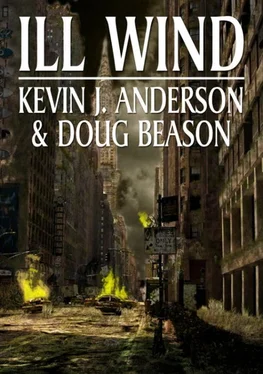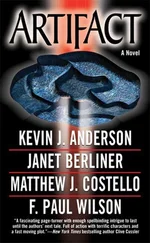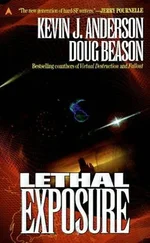Connor grinned and started for the trailers.
As he stepped into the field, he discovered that the glints came not from wires, but from thousands of slender metal poles low to the ground, like a giant pin cushion in the desert.
He ducked through the strands of a barbed wire fence that ran around the antenna complex. It felt weird, walking through the field of metal poles. He stepped on fine wires that ran from the bottoms of the poles, kicking a few loose.
Picking up the pace, he made his way to the trailers. It wouldn’t be long now.
* * *
From his team’s camouflaged position at the top of the EM launcher rails, Todd Severyn watched Bayclock’s soldiers camped near the control building below. The troops had dug in, pitching their tents in the foothills, while the general set up his command post inside the burned shell of the building itself.
Todd saw Spencer’s white flag approach the encampment, surrounded by escorts. Waiting within view on the other side of the long metal rails, Rita Fellenstein signaled Todd. She had seen Spencer’s arrival as well.
Time to move in.
Todd jammed his cowboy hat on his head, then bent low over the horse’s neck. Rita tightened the string on her bush hat, and waved for the ranch hands to follow. With Todd came seven other ranchers from Alamogordo, all on horseback and carrying crude grenades made from the potent-smelling citrus-based explosives.
Todd and Rita both led their horses, picking up speed as they trotted down the service trail on either side of the long electromagnetic launcher. They would attack in two prongs, striking from either side of the supply camp. He just hoped they could manage not to blow themselves up when they lobbed the home-made grenades into Bayclock’s troops.
Unable to restrain themselves once they urged their horses into a full gallop, Todd’s attackers let out a loud war yell as they charged toward the camp.
* * *
Sitting in the shade near the blockhouses, Gilbert Hertoya watched the confrontation between General Bayclock and Bobby Carron. The two men crouched in a coiled stance, circling and glaring. The empty noose still dangled from the utility pole, and Spencer Lockwood was coming in under a white flag.
The short engineer felt his hope draining. He didn’t want to give up, but their chances seemed to be fading away. It had been absurd in the first place to think they could drive off a fully armed invasion force.
The nerves in Gilbert’s legs hurt with a throbbing, insistent pain, but he tried to ignore it. He had to focus his thoughts to formulate some way he could help Bobby, or stop Spencer from surrendering—or at the very least hurt Bayclock.
Bobby Carron lunged at the general, feinting with a left-handed blow to the stomach, which Bayclock blocked, then lashing out with a quick hammer-punch to the general’s face. Bobby struck him squarely in the nose, once, twice, before snapping backward to avoid a counterpunch.
Though he himself wasn’t much of a hand-to-hand fighter, Gilbert knew that the nose was a non-crippling but singularly effective place for a blow to land. Bobby’s punch would have sent a bright explosion of pain into Bayclock’s head, blinding him with a sudden flood of reflexive tears. A splash of scarlet blood dribbled out of his nostrils and splattered on the pale sands.
“Face it, you’re too old, General,” Bobby said.
Some of Bayclock’s troops had drawn up as spectators, but they remained oddly subdued and silent, as if they refused to cheer for the general but were afraid to cheer for his opponent. They stepped back, giving the two fighting men room.
Bayclock launched himself forward, moving his legs like pistons and butting Bobby in the stomach. Bobby let out an “oof!” but managed to sidestep part of the attack. As Bayclock crashed into him, Bobby caught the general’s foot with his own and tripped them both. They tumbled to the ground.
Bobby scrambled to get to his feet again, rolling away from Bayclock’s grasping hands. “Can’t fly, can’t fight—what else can’t you do, old man?” he gasped.
Bobby got to his knees, white dust covering his blue Air Force uniform. Bayclock’s nose continued to bleed onto the sand.
Gilbert tore his concentration away from the fight and looked into the sky. He had no way of telling accurate time, but the sun stood at about noon, and the Seven Dwarfs would orbit overhead any moment now.
He lay by the wreckage of the railgun. In the explosion, the capacitors had ruptured and the banks of storage batteries had burned. During the day of waiting and recovery, Arnie had lovingly disconnected and removed the blackened shapes. Given time and resources, they could repair everything—but it did not look like the general would give them the opportunity.
Every day at noon, though, when the Seven Dwarfs passed over the White Sands antenna farm, the solar energy beamed down to the collectors was distributed through the repaired power grid, charging up caches of batteries to run various equipment. A direct power line ran up to the EM launcher to charge the batteries for the railgun, but now those batteries had been destroyed and the ruined capacitors taken off-line.
The solar smallsats didn’t know that, however. They would continue to beam their power, and the electrical lines would run the current up to the railgun facility. Disconnected from any source, the cable would become a live wire for the twenty minutes that the satellites passed overhead transmitting their energy.
A live wire . As everyone watched the fistfight, Gilbert Hertoya took the disconnected cable, praying as he touched it that the deadly current wasn’t already flowing. No guard watched him closely, with both of his legs heavily bandaged.
Gilbert dragged himself to the metal superstructure of the railgun. He jammed the end of the wire into the steel base, then backed away—ignoring the sharp darts of pain jabbing his legs in a thousand places. He collapsed back on the dirt, trying to keep from passing out.
From the other side of the group of buildings, Arnie saw what Gilbert had done, and his eyes widened. Gilbert winked and crossed his fingers. In response, Arnie crossed his fingers, too.
Bayclock attacked Bobby again, and the fight went on.
* * *
Seven hundred kilometers overhead, seven satellites flew in a constellation of four planar orbits, inclined at 45 degrees from the equator. Tiny solar-electric thrusters boiled plasma off their electrodes, keeping the satellites positioned in orbit, cancelling perturbations caused by gravitational variations in the Earth’s crust.
The satellites updated their position using the military’s still-functioning Global Positioning Satellites, making necessary corrections. Each smallsat carried a tiny atomic clock, attuned to the energy of a certain fundamental transition frequency to know when they were. Isolated from the events taking place below, the satellites functioned as programmed.
One minute before noon, Mountain Standard Time, the lead satellite swung its gimboled antenna toward the horizon. Energy collected by the array of inflatable solar-cell panels was converted into electricity, which trickled into the transmitter.
The satellites silently began to irradiate the microwave antenna farm at White Sands.
* * *
Connor Brooks was within two hundred yards of the edge of the antenna farm when he heard sparks jumping from the metal poles of his backpack. The sound scared him—it was if he had fallen into the middle of a huge popcorn popper.
At the same instant, his head began to grow hot. Very hot. The thermal blanket felt as if it had suddenly turned into napalm. The searing fabric pressed down upon his skull, across the back of his neck. Only seconds earlier, he had enjoyed the relative coolness of being shielded from the sun, but it now felt like molten lead.
Читать дальше












